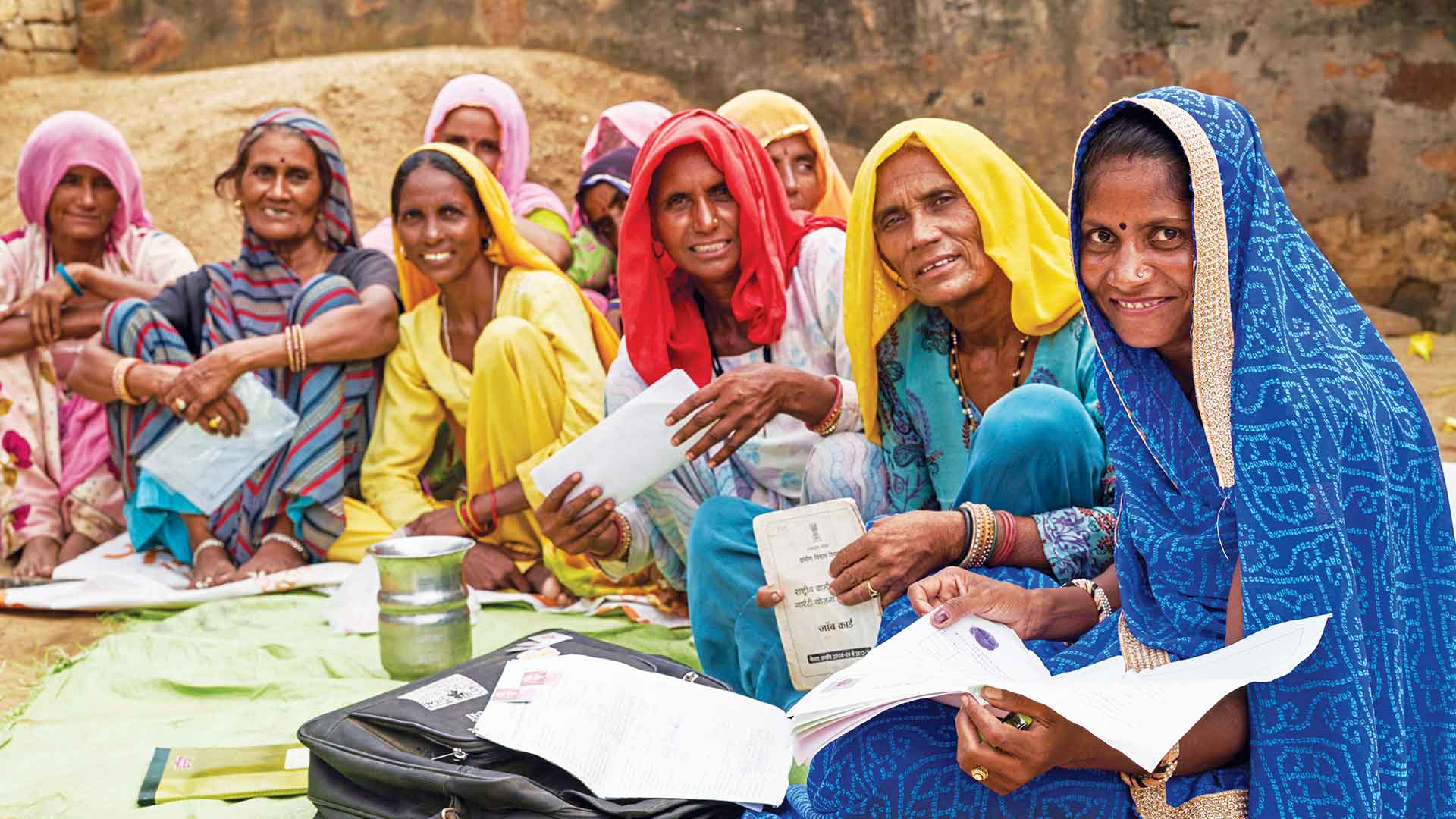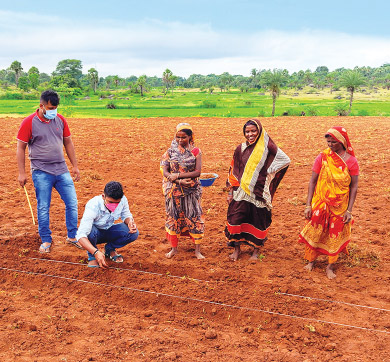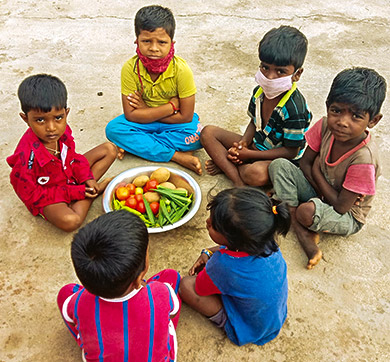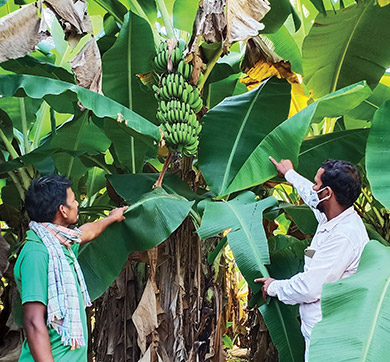December 2021 | 1953 words | 7-minute read
"I could not speak English fluently earlier, particularly in public. But now I have become more confident and that has helped my students. My Class II kids used to say ‘gilaas’, now they pronounce it as ‘glass’.” This is the feedback from Apeksha Tai, a schoolteacher in Maharashtra who attended the state-mandated English language teaching training programme called Tejas.
Tejas is a collaborative effort between the Maharashtra government, the Tata Trusts and British Council, which has trained 51,000 government schoolteachers in English speaking skills. It has also created the custom pedagogy framework that would both sustain and cascade the learning.
Alignment with state governments allows the Trusts to upscale projects through state machinery for optimal social impact. R Pavithra Kumar, chief programme director at the Tata Trusts, explains: “Our pan-India presence is an advantage when we speak to state governments about our programmes. When we get a positive response, we run a pilot in that state to show proof of concept. Once the project shows success, we scale up and talk to other governments to replicate our learnings.”
The nutrition portfolio’s experience with rice fortification is an example of how impact ripples across state borders. The first pilot plants for fortifying rice kernels with nutrients were set up in Andhra Pradesh and Maharashtra in 2018. The Trusts worked with the State Civil Supplies Corporation to ensure that fortified rice was made easily available across the public distribution system.
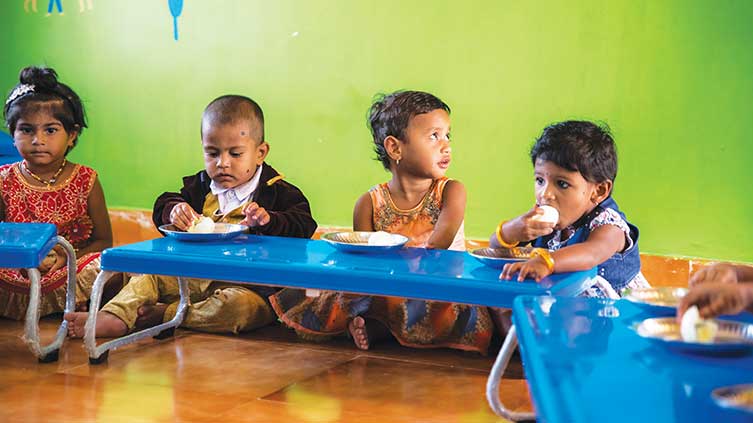
Model backing
The Trusts have developed a unique operating model that supports such widespread projects. They have set up associate organisations, or Sector 8 companies, in specific geographies such as the Centre for microFinance which operates in Rajasthan, Kalike in Karnataka, and in other places. These organisations are the ground-level implementers of projects across thematic areas.
When the need is greater, the state interventions take on a sharper focus. The Assam Cancer Care Foundation was set up in partnership with the government in 2017 to create a state-wide network of cancer facilities. During the peak of the Covid wave, the state governments of Uttar Pradesh and Maharashtra asked the Trusts to set up new hospitals. That they could (and did) meet these responsibilities, is a testament to the expertise that makes the Trusts a force in the social sector.
The Tata Trusts' extended network of implementing cells:
- Karnataka - Kalike started in the developmentally-challenged Yadgir district and works in WASH, livelihoods, nutrition and education.
- Rajasthan - Centre for microFinance is engaged in community interventions for livelihoods, education, health and nutrition.
- Gujarat - Coastal Salinity Prevention Cell supports coastal communities in combating soil salinity through sustainable livelihood, WASH and education programmes.
- Andhra Pradesh and Telangana - Vijayavahini Charitable Foundation works with marginalised communities on skilling, livelihoods, health and education.
- Punjab - Reviving the Green Revolution Cell works closesly with the Punjab Agricultural University to develop best practices in agriculture.
- Uttar Pradesh - The Eastern UP initiative works to improve education and literacy among marginalised communities.
- Odisha - Livolink Foundation has helped to reduce malaria incidence as well as improve access to livelihood and better healthcare programmes.
- Assam + Tripura + Manipur + Meghalaya - Centre for Microfinance and Livelihoods works to build sustainable income streams and improve education.
- Uttarakhand - Himmotthan Pariyojana addresses the development challenges faced by rural communities in the state's hilly areas.
- Jharkhand + Madhya Pradesh + Maharashtra - Collectives for Integrated Livehihood Initiatives works to support tribal populations in central India.
- Mizoram, Nagaland and Arunachal Pradesh - North East Initiative Development Agency supports the region by programmes for livelihoods, WASH and sports.
Connecting to health
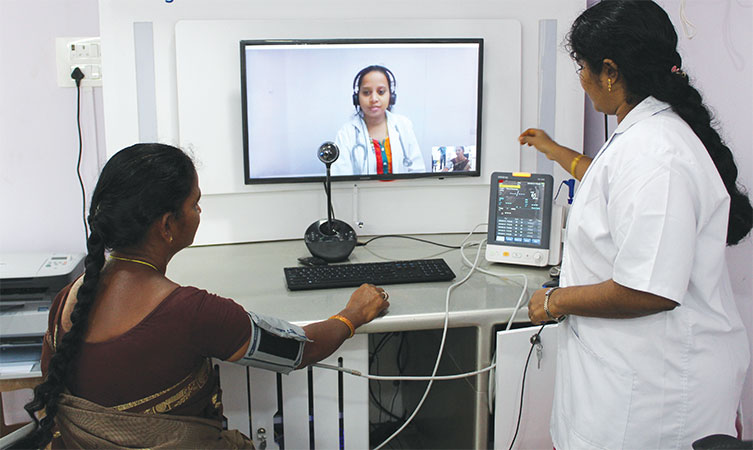
Technology — and the adjunct capacity building — is the key weapon in the Trusts’ efforts to modernise state healthcare systems. Telangana has been a successful incubator of the Trusts’ multi-pronged approach that spans digital health records, telemedicine, and healthcare worker training.
Here, the Trusts trained over 5,400 healthcare workers in the use of technology. This contingent has screened over 9 million people for noncommunicable diseases. The exercise has brought to light over a million potential cases, and as many as 1.76 million patients were referred for treatment. Patient records were also digitised for accuracy and convenience. In all, around 1.95 million people in Telangana registered for e-health records. The success of the programme has led to both the NCD app and the digital health record initiative being adopted on a national scale.
Telemedicine was another successful state initiative. The Trusts trained healthcare providers in telemedicine and set up over 30 hubs in district-level, tertiary hospitals that connect with over 500 primary health facilities. A care coordination centre in Hyderabad supports the hub-and-spoke network to enable seamless care. The platform has conducted more than 53,500 virtual consultations across 13 specialties.
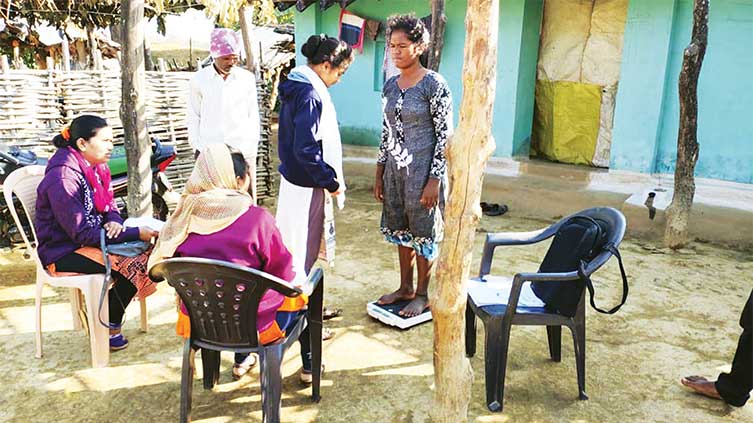
This model is bridging the urban-rural divide, creating access to specialty care in rural areas and reducing the out-of-pocket expenses usually borne by patients for travel and in-person consultations.
Not surprisingly, the Telangana model has drawn interest from other states as well. Madhya Pradesh has brought the Trusts on board for a similar strategy. Here, the Trusts are working with the government in 23 districts to establish a chain of 500 health and wellness centres in rural areas, and 23 urban primary health centres.
The project will directly benefit 10,000 healthcare workers and around 2.5 million citizens utilising these centres.
Education gets a boost
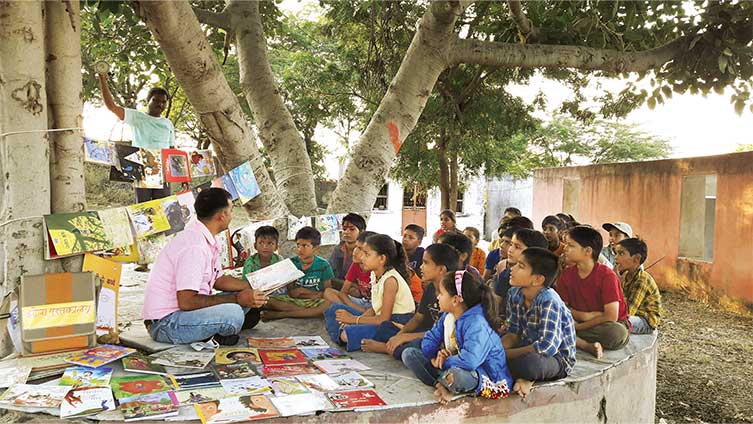
The Trusts’ education vertical is home to a slew of successful projects that follow different strategies to achieve a unified goal – improving learning outcomes.
In Karnataka, the Trusts’ associate organisation, Kalike, works in six districts to develop anganwadis as centres that would guide the first learning experiences of young children. The programme started with capacity building for 44 child development project officers (CDPOs) and 385 supervisors. This cohort has cascaded the training to over 13,330 anganwadi workers. The early childhood education effort has touched nearly 400,000 children so far.
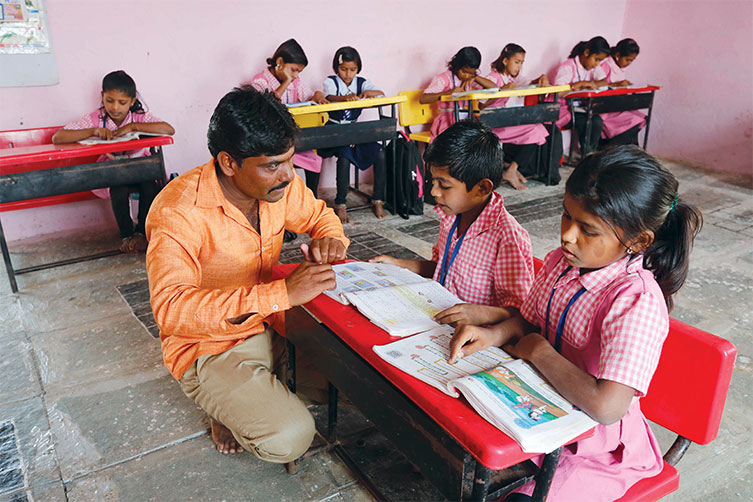
School libraries are a focus area in Rajasthan, where the Trusts worked with the Rajasthan Council for School Education to build 34 model libraries. The framework is being replicated in 3,300 more school libraries across state schools, and over 2,000 panchayat education officers and school principals will be trained in library management.
There are other initiatives with similar impact. In Assam, the Trusts train government schoolteachers to use technology in the classroom so that students get prepared for the digital world. In Jharkhand, the Trusts support parents to become involved in school management to make schools better.
Systems for nutrition
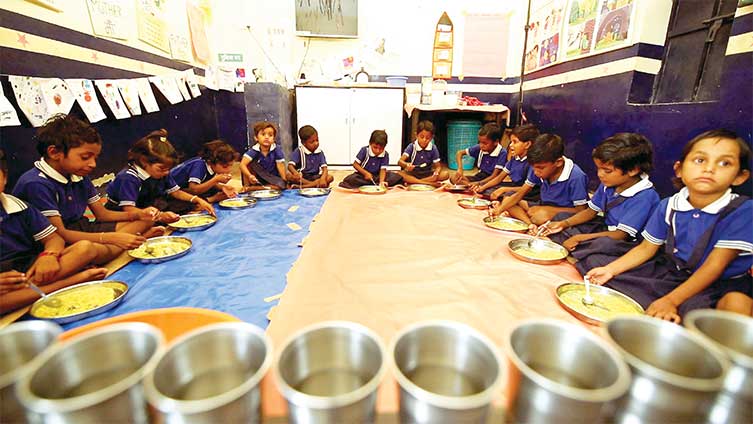
The Trusts’ nutrition portfolio taps into state systems to strengthen them from the inside. In Maharashtra, the Trusts work in the backward districts of Palghar, Chandrapur and Gadchiroli to strengthen anganwadis’ capabilities in terms of mother-child health and nutrition services. These districts were selected due to their staggering child malnutrition levels. Since April 2017, the Trusts have worked to upgrade 4,114 anganwadis into clean, child-friendly and colourful spaces. Weighing machines, stadiometers, water purifiers, early education toys and other equipment have been provided, and anganwadi workers trained to work in convergence with local healthcare staff. Frontline workers, along with communities, have also been trained on mother, infant, and young child nutrition. The team has also taken the message to the community by training members of the Panchayat Raj Institute to monitor the services offered by anganwadi centres.
Another initiative involves encouraging the use of double-fortified salts as a cheap and convenient source of micronutrients. The team partnered the Tamil Nadu Salt Corporation to set up a plant for salt fortified with iodine and iron. Supplying these salts through the public distribution system magnifies the outreach against common conditions such as anaemia. The Trusts have been a key partner for this intervention in Andhra Pradesh, Jharkhand, Madhya Pradesh, Maharashtra and Uttar Pradesh. A study in five districts of Uttar Pradesh showed a lowering in risk of anaemia among regular DFS users. In all these projects, the work is buttressed by building community awareness and capacity building of frontline workers.
Opening up livelihoods
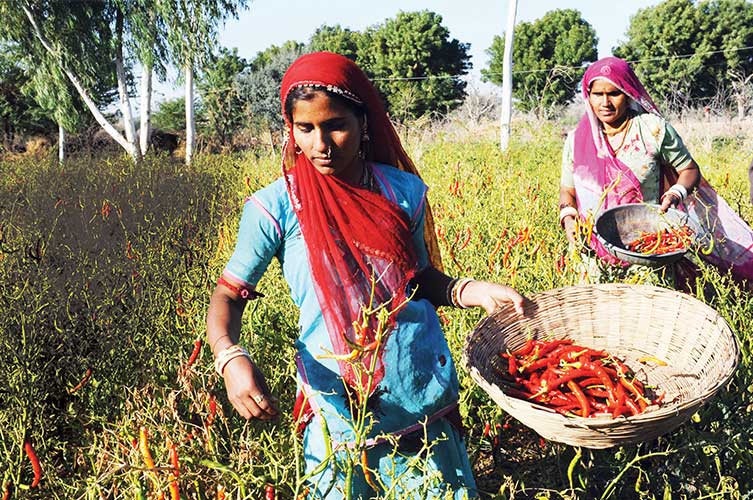
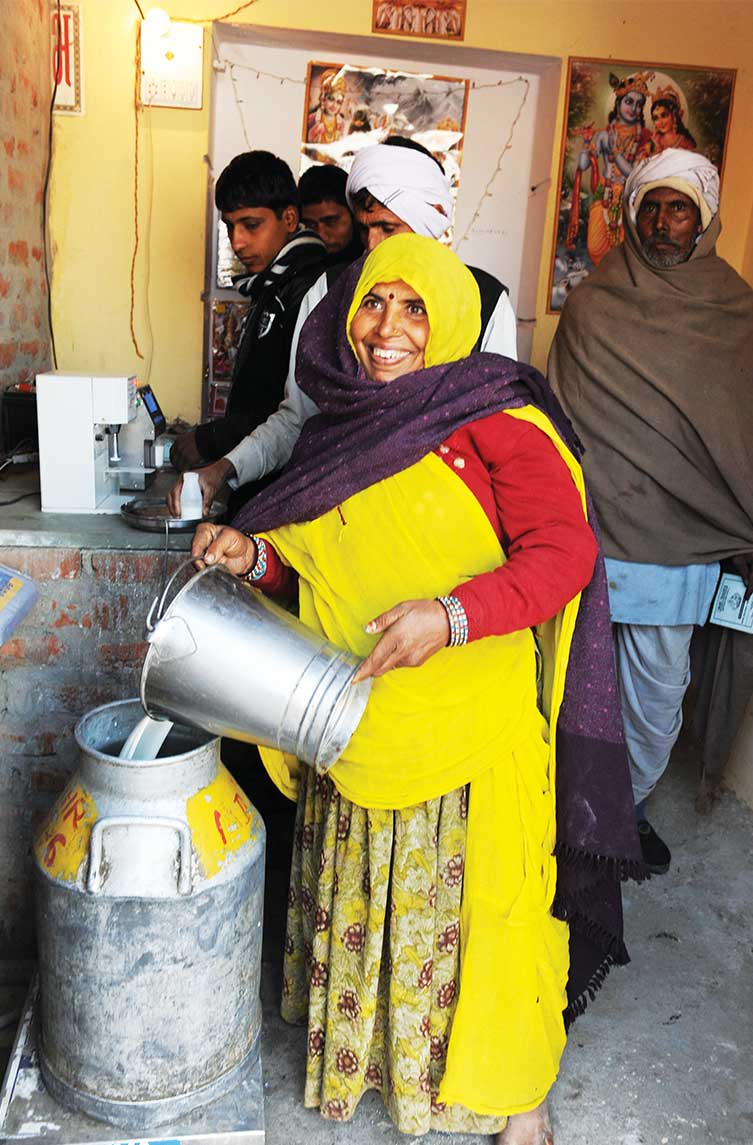
Diversified livelihoods create a safety net for poor, rural households, especially when droughts hit or crops fail. In multiple states, the Trusts work directly with communities to encourage income generation through alternative means such as horticulture, dairy, fisheries, poultry farming etc. Over 1.4 million households earn more as a result of these initiatives. Here’s a glimpse of how this works.
In 2017, the Trusts signed up with the Uttarakhand State Rural Livelihood Mission to upskill thousands of households. Among the beneficiaries were Vijay and Seema Kaintura, who had left Delhi during the Covid lockdown and returned to Chinyalisaur, in Uttarkashi district. With training from Himmotthan, the Trusts’ associate organisation, the Kainturas set up a poultry farm with 50 chickens. Over one year, the business has grown to 3,000 chickens, sells in different local markets, and now employs local people. In four years, Himmotthan has mobilised over 20,040 households and developed over 3,000 community-based organisations for livelihood support under the Livelihood Skill Uttarakhand programme.
In Jharkhand, the Trusts’ associate CInI works with 30,000 households under the Lakhpati Kisan livelihood initiative. In 2020, CInI partnered the state rural development department to introduce horticulture for tribal communities. As a result, vegetable gardens and mango orchards are coming up on barren land, supported by seepage wells and solar-powered irrigation built using NREGA funds. CInI has also helped build village clusters for better market linkages. Over 400 households are already seeing the fruits of this initiative.
Facts, figures and the future
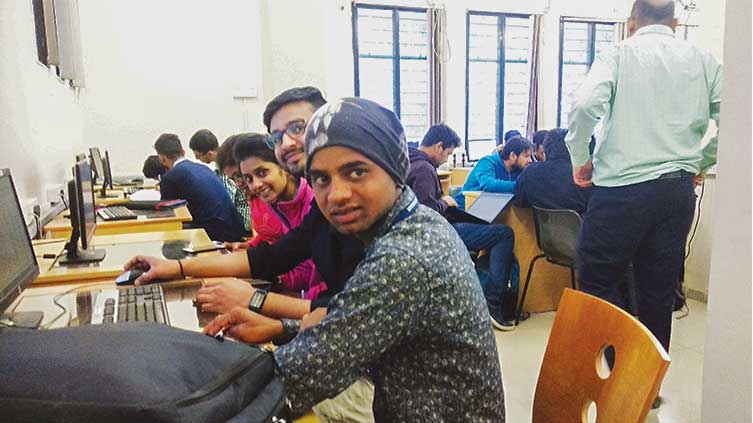
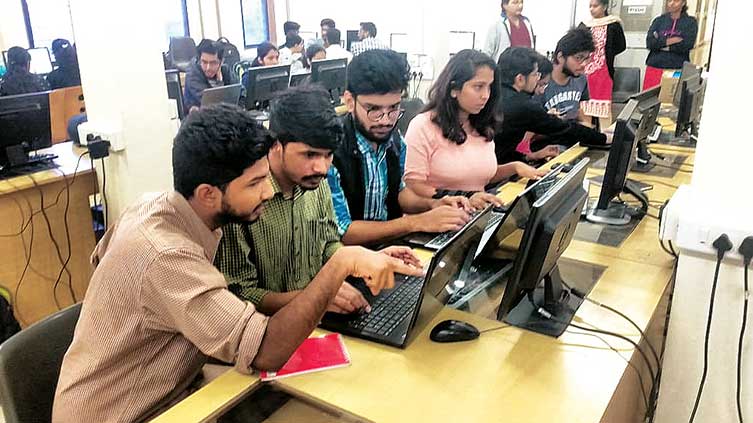
The Trusts have taken data-based governance down to the village panchayat level. The project, in Maharashtra’s developmentally-challenged Chandrapur, district shows how this microplanning works for the betterment of villages. In three blocks, village-level data was collected on individuals, households, schools, anganwadis, village gram panchayats, health centres etc to get a complete picture of what each village needed to improve development metrics. The data, analysed on the Trusts’ DELTA framework, was used to create village development plans for 290 villages. This data-supported microplanning feeds into the district and state budgeting exercise. More important, the project made communities aware of how participating in village development plans can influence policy making and thus, civic improvement. Chandrapur also came under the ambit of the Village Social Transformation Foundation, which helped channelise government and CSR funds towards rural development.
The Trusts took the Chandrapur initiative further to ensure last-mile linkages between funding and development. Individuals were supported in getting their documentation papers (such as birth and caste certificates). Gram sabhas (the electoral base that votes for local bodies) were activated, mahila sabhas (women’s groups) were empowered and thousands of youth volunteers were trained as community resource members. Communities were made aware of government schemes for water and sanitation, livelihoods, health and nutrition. Village development plans were written on walls so that the entire community could track progress.
The impact: Instead of development funds being diverted, an average of 58% of the village development plans are now being implemented. For instance, about Rs 620 million in government funds have reached these 290 villages to build better roads, toilets, and so on, thus improving the lives of 225,000 people.
—Philip Chacko & Gayatri Kamath
Source: Tata Trusts' Horizons, December 2021 issue




